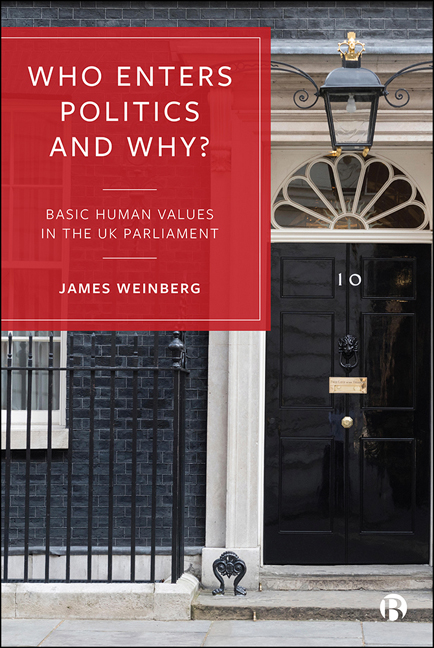Book contents
- Frontmatter
- Dedication
- Contents
- List of Figures and Tables
- Note on the Author
- Acknowledgements
- 1 Why Do We Hate Politicians?
- 2 Psychological Scrutiny: Who Enters Politics and Why?
- 3 All the Same! Demographic Homogeneity and Careerism
- 4 Basic Values and Partisanship
- 5 Parliamentary Behaviour: Personal Choices, Political Results
- 6 Perfect Politicians? Voting Preferences in the United Kingdom
- Notes
- Appendix A Twenty Item Portrait Values Questionnaire (TwIVI)
- Appendix B Confirmatory Factor Analysis of Survey data on the Basic Values of Politicians (UK Members of Parliament, N = 168)
- Appendix C External Correlations Across Samples
- Appendix D Conjoint Experiment of Candidate Preferences by Partisanship
- References
- Index
1 - Why Do We Hate Politicians?
Published online by Cambridge University Press: 12 March 2021
- Frontmatter
- Dedication
- Contents
- List of Figures and Tables
- Note on the Author
- Acknowledgements
- 1 Why Do We Hate Politicians?
- 2 Psychological Scrutiny: Who Enters Politics and Why?
- 3 All the Same! Demographic Homogeneity and Careerism
- 4 Basic Values and Partisanship
- 5 Parliamentary Behaviour: Personal Choices, Political Results
- 6 Perfect Politicians? Voting Preferences in the United Kingdom
- Notes
- Appendix A Twenty Item Portrait Values Questionnaire (TwIVI)
- Appendix B Confirmatory Factor Analysis of Survey data on the Basic Values of Politicians (UK Members of Parliament, N = 168)
- Appendix C External Correlations Across Samples
- Appendix D Conjoint Experiment of Candidate Preferences by Partisanship
- References
- Index
Summary
‘[Successful politicians are] … People with ability. People with ambition. People who are connected.’
Labour Party MP (Interviewee 8)Long before the election of Donald Trump, the UK's referendum on membership of the European Union, the rise of populism across Europe, or the UK expenses scandal in 2009, the late Anthony King (1981) wrote of the biggest divide in British politics as that between Britain's whole political class and the great majority of the British people. The ‘anti-politics’ phenomenon is now well documented in Britain: low levels of party membership and diminishing partisanship per se, poor electoral turnout, badly performing governments and failures of accountability, and plummeting trust in political elites have all been common research foci and the subjects of academic as well as journalistic debate (Hay, 2007; Norris, 2011; Flinders, 2012). Yet the literature seeking to explain and understand this crisis of democracy focuses almost singularly on popular notions of what politics is and how it should work. By contrast, political science has failed to engage sufficiently with those who actually occupy political office: who they are, why they do it, or what they think and feel about a job that few of us would ever care to contemplate. Where existing research does focus on politicians, it has largely iterated an uncomfortable narrative of public hostility and alienation (Stoker et al, 2016; Clarke et al, 2018); it has explored how elected representatives are expected to behave (Carman, 2006; Bengtsson and Wass, 2010; Andre and Depauw, 2017); and it has developed our understanding of what politicians ‘do’ from analyses of parliamentary records and processes (Hix et al, 2007; Saalfeld, 2011; Geddes, 2020).
At the same time, survey data continue to reveal remarkable levels of public distrust, political apathy, political inefficacy and democratic despondency that crystallize around popular judgements about those who actually govern. The Hansard Society's 2019 audit of political engagement in the UK concluded: ‘[o] pinions of the systems of governing are at their lowest point in the 15-year Audit series – worse now than in the aftermath of the MPs’ expenses scandal’ (p 3).
- Type
- Chapter
- Information
- Who Enters Politics and Why?Basic Human Values in the UK Parliament, pp. 1 - 24Publisher: Bristol University PressPrint publication year: 2020



